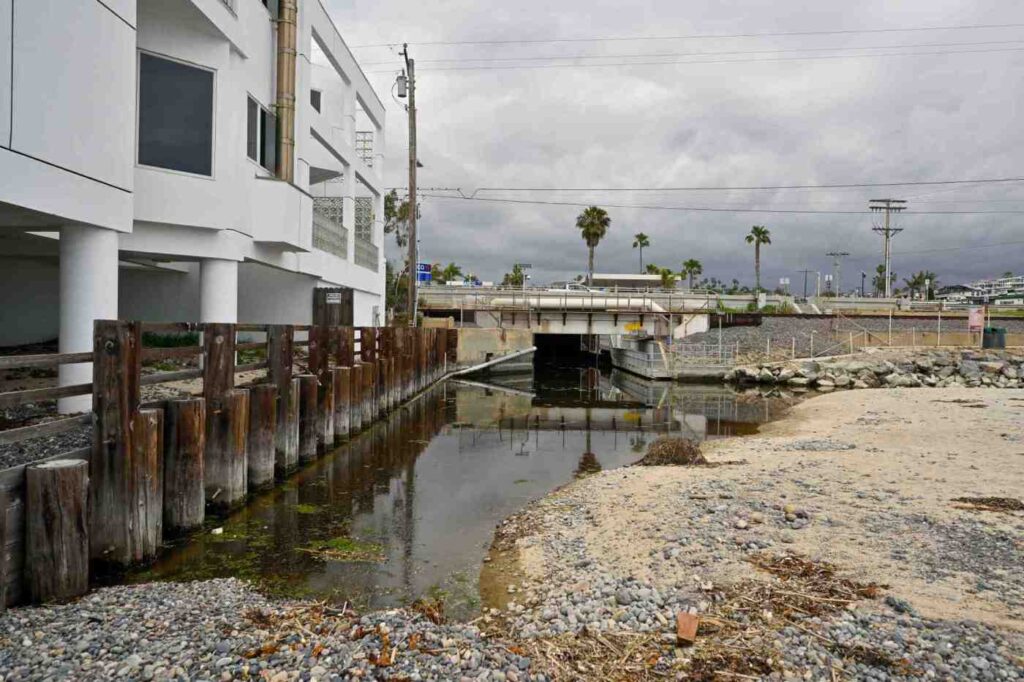
San Clemente’s Poche Beach has been plagued with water-quality problems through the years, regularly landing on Heal the Bay’s dreaded “Beach Bummer” list.
But officials hope recently approved grant funding will kick start efforts for a solution to help the beach, wedged between San Clemente and Dana Point, and make it a place where visitors won’t have to worry about water quality issues.
The Orange County Transportation Authority is providing the effort $2.5 million in Measure M2 funds through its Environmental Cleanup Program. Another $1 million in federal funding, secured by Rep. Mike Levin, will also go toward what’s being called the “Poche Beach Water Reclamation Project.”
The new “low-flow diversion project” at Poche Beach hopes to help the area meet the state’s dry-weather bacteria standards, impacted regularly due to urban runoff and groundwater that brings pollutants from the Prima Deshecha watershed.
Currently, an inflatable dam reroutes potential contaminated flows for UV treatment, but it cannot operate during high tide events.
Runoff from a storm drain flows directly onto Poche Beach in 2023. The beach is regularly on Heal the Bay’s Beach Bummer list. (Photo by Jeff Gritchen, Orange County Register/SCNG)
“You have a pond that is under the influence of tidal conditions, it ends up being a breeder of bacteria,” said David Rebensdorf, San Clemente public works director. “We’re excited about the grants we’ve received.”
The entire project is expected to cost $7.2 million, though officials will need to figure out how to fund the remainder of the project to move forward. In addition, $900,000 annually will be needed to maintain the system.
Starting in 2003, the city collected a fee on properties to fund a Clean Ocean Program, reauthorized by voters in 2013, but that funding expired in 2020. An effort for a half-cent sales tax, Measure BB, that could help fund projects such as the plan at Poche Beach, failed in November’s election. At 64.62% of the vote, it fell just shy of the two-thirds majority needed to pass.
The first phase of the Poche Beach project would be to build a new diversion point further inland, about 100 feet upstream, with hopes of eliminating dry-weather discharges that can transport bacteria to the beach.
Runoff from a storm drain flows directly onto Poche Beach in 2023. The beach is regularly on Heal the Bay’s Beach Bummer list. (Photo by Jeff Gritchen, Orange County Register/SCNG)
That system would collect up to 400 gallons of dry-weather runoff per minute from the Prima Deshecha and Cascadita storm drains, according to a city staff report.
A second phase of the project would use a microfiltration-reverse osmosis treatment system to deliver to a local wastewater treatment plant, using the runoff to be repurposed as recycled water.
The residual brine would be discharged to the San Juan Creek Ocean Outfall set two miles out into the ocean.
Related Articles
Rescue team tracking entangled humpback last seen off O.C.’s coast
Jet skiing Santa visits Bolsa Chica, and best spots to snap seaside holiday card photos
Laguna Beach lifeguards are first department in OC to deploy EVs for beach patrol
Surfing dog earns spot on Surfers’ Hall of Fame in Huntington Beach
Leaping humpbacks, unseasonal blue whales, dolphin super pods offering action on the ocean
That second phase needs further investigation to find out if there’s a need for the recycled water from nearby water districts, Rebensdorf said.
The beach is county-owned right at the outlet, but to the south sits the private Shorecliffs beach, and to the north Dana Point’s Beach Road community.
“It’s a great little beach so if we could clean up the water, it would probably get used more than it does now,” Rebensdorf.
If the council approves funding, the next step would be to select a design, then secure permitting before construction could begin.
Past efforts to clean up the beach include a falconer hired to shoo away the sea gulls, which would travel back and forth from the county landfill, and hang out in the stagnant pond contributing to the poor water quality issue.
The birds haven’t been a problem recently, so that program was halted a few years back, Rebensdorf said.
The OCTA funding, provided through the voter-approved Measure M half-cent sales tax for transportation, “helps cities and the county remove pollutants from streets in cities across the county before they reach waterways and the ocean,” according to OCTA.
“Along with improving transportation on our streets, freeways and the transit system, I’m proud that OCTA supports these water-quality projects to benefit all of our communities, including beach cities such as San Clemente,” OCTA Chair Tam T. Nguyen said in a statement. “This shows we can continue to move people safely and efficiently while protecting our environment at the same time.”
